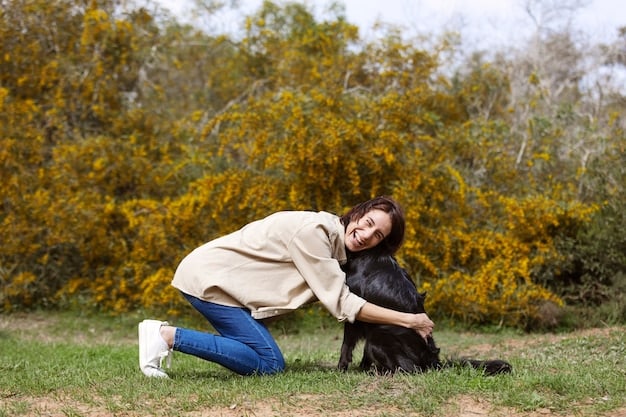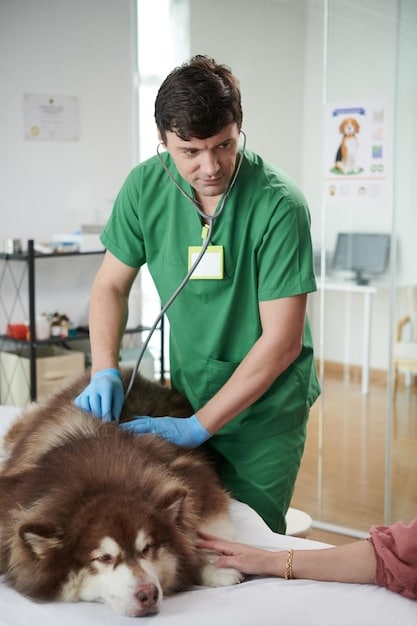Potty Training Regression: 3 Proven Methods to Get Your Dog Back on Track

Anúncios
Potty training regression in dogs can be frustrating, but with consistent reinforcement, positive techniques, and addressing underlying causes, you can successfully get your furry friend back on track.
Is your perfectly potty-trained dog suddenly having accidents inside? You’re likely dealing with potty training regression? 3 Proven Methods to Get Your Dog Back on Track This Month can help you solve this issue.
Anúncios
Understanding Potty Training Regression in Dogs
Potty training regression is when a dog that was previously reliably house-trained starts having accidents indoors again. It can be frustrating for owners, but understanding the causes and how to address them is key to getting your dog back on track.
It’s essential to differentiate between true regression and incomplete initial training. If your dog wasn’t fully potty-trained to begin with, the “regression” might simply be inconsistency in their training. True regression occurs when a previously reliable dog suddenly starts having accidents.
Anúncios
Common Causes of Potty Training Regression
- Medical Issues: Urinary tract infections (UTIs), kidney problems, diabetes, and other medical conditions can cause increased urination or loss of bladder control.
- Stress and Anxiety: Changes in the environment, such as moving, new family members (human or animal), or loud noises, can trigger anxiety and lead to accidents.
- Changes in Routine: Inconsistent feeding or walking schedules can disrupt a dog’s potty habits.
- Age-Related Issues: Senior dogs may experience decreased bladder control due to aging.
Identifying the underlying cause is the first step in addressing potty training regression. Observe your dog’s behavior and consult with your veterinarian to rule out any medical issues. Once a cause is known, steps can be taken to solve the problem.
Method 1: Reinforce the Basics of Potty Training
Even if your dog was previously potty-trained, going back to the basics can help re-establish good habits. Reinforcing the fundamentals keeps your dog aware of what is expected of them.
This involves consistent potty breaks, positive reinforcement, and re-establishing a routine that they understand.
Establish a Consistent Potty Schedule
Take your dog out to potty at consistent times each day, such as first thing in the morning, after meals, and before bedtime. Set a repeating schedule that your dog can adjust to.
Use Positive Reinforcement
- Reward Immediately: When your dog potties outside, immediately praise them enthusiastically and offer a tasty treat.
- Keep it Positive: Avoid scolding or punishing your dog for accidents. This can create fear and anxiety, making the problem worse.
- High-Value Treats: Use treats your dog loves to make the experience even more rewarding.
Consistency, positive reinforcement, and patience are essential when re-establishing good potty habits.

Method 2: Address Underlying Stress or Anxiety
If stress or anxiety is contributing to the potty training regression, addressing these issues is crucial. Identifying and mitigating the source of stress may be the solution.
Creating a safe and comfortable environment and using calming techniques can help alleviate anxiety and reduce accidents.
Identify and Remove Stressors
Try to pinpoint what might be causing your dog’s stress or anxiety. Is it a new pet, a change in the household, or loud noises? Removing or minimizing exposure to these stressors can help.
Create a Safe Space
- Comfortable Den: Provide your dog with a comfortable, safe space, such as a crate or bed, where they can retreat when feeling anxious.
- Calming Aids: Use calming aids like pheromone diffusers or calming treats to help reduce anxiety.
- Consistent Routine: Maintain a consistent daily routine to provide a sense of security and predictability.
Addressing anxiety is a crucial step in resolving potty training regression caused by stress.
Method 3: Rule Out Medical Issues
Potty training regression can sometimes be a sign of an underlying medical issue. Always consult your veterinarian as a preventative measure.
A thorough veterinary examination can rule out medical conditions that may be contributing to the problem and help determine the appropriate course of treatment.
Common Medical Causes
- Urinary Tract Infections (UTIs): UTIs can cause frequent urination and discomfort, leading to accidents.
- Kidney Disease: Kidney problems can impair a dog’s ability to concentrate urine, resulting in increased urination.
- Diabetes: Diabetes can lead to increased thirst and urination.
- Bladder Stones: Bladder stones can cause irritation and frequent urination.
Veterinary Examination
Schedule a veterinary appointment to discuss your dog’s potty training regression. Your veterinarian may recommend blood tests, urine tests, or other diagnostic procedures to determine if there is a medical cause. This diagnosis may uncover otherwise unnoticeable problems your dog may have.

Preventing Future Potty Training Regression
Once you have addressed the immediate issue of potty training regression, taking steps to prevent future occurrences is essential. Potty training regression can be avoided by keeping an eye on the causes.
There are several things to consider when it comes to preventing future regressions. It is important to prioritize what will be best for your dog.
Maintain a Consistent Routine
Stick to a consistent feeding and walking schedule to help regulate your dog’s potty habits. Consistency is key to preventing future accidents.
Monitor for Stress and Anxiety
Pay attention to your dog’s behavior and watch for signs of stress or anxiety. Address any potential stressors promptly to prevent them from escalating. A happy and relaxed dog is less likely to have accidents.
Regular Veterinary Check-ups
Schedule annual veterinary check-ups to monitor your dog’s overall health and catch any potential medical issues early, so that they might avoid the regression altogether. Early detection and treatment can help prevent medical conditions that may not only trigger the regression, but also be harmful for the dog.
Stay Positive and Patient
Dealing with potty training regression can be frustrating, but staying positive and patient is crucial. Your dog isn’t intentionally misbehaving; they may be experiencing a medical issue, stress, or anxiety.
With consistent reinforcement, addressing the underlying causes, and patience, you can successfully get your dog back on track.
Remember that every dog is different, and it may take time to resolve the issue. Don’t get discouraged if you don’t see results immediately. Consistent effort will eventually pay off, and your dog will regain their potty training habits.
| Key Point | Brief Description |
|---|---|
| 🗓️ Consistent Schedule | Regular potty breaks help prevent accidents. |
| 😊 Positive Reinforcement | Reward successful potty breaks with praise and treats. |
| 🩺 Medical Check-Up | Rule out any underlying health issues causing regression. |
| 🧘 Reduce Stress | Minimize stressors and provide a safe, comfortable environment. |
Frequently Asked Questions
▼
Sudden accidents can be due to medical issues, stress, changes in routine, or incomplete initial training. Consult a vet to rule out health problems.
▼
Medical issues often involve increased frequency or urgency. Behavioral issues may correlate with stressful events or changes in the environment.
▼
No, punishment can create fear and anxiety, making the problem worse. Focus on positive reinforcement and rewarding good behavior.
▼
The timeline varies depending on the cause and consistency of training. It may take a few days to several weeks to see improvement.
▼
If regression persists, consult with a veterinarian or a professional dog trainer to get personalized advice. They can help identify underlying issues.
Conclusion
Potty training regression in dogs can be challenging, but with a strategic approach that includes reinforcing basic training, addressing underlying stress or medical issues, and maintaining a positive and patient attitude, you can help your furry friend get back on track. Remember to stay consistent, offer plenty of praise, and seek professional advice when needed.






